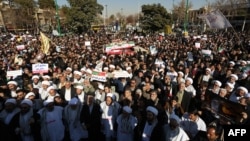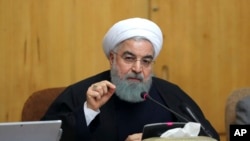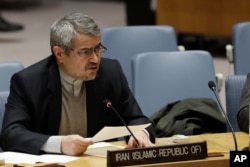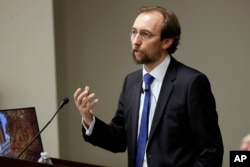The U.S. Treasury placed sanctions Thursday on five Iranian-based entities either owned or controlled by the company responsible for developing and producing Iran’s solid-propellant ballistic missiles.
“These sanctions target key entities involved in Iran’s ballistic missile program, which the Iranian regime prioritizes over the economic well-being of the Iranian people,” U.S. Treasury Secretary Steven Mnuchin said in a statement.
The five sanctioned entities -- all owned or controlled by Shahid Bakeri Industrial Group -- are the Shahid Eslami Research Center, Shahid Kharrazi Industries, Shahid Moghaddam Industries, Shahid Sanikhani Industries and Shahid Shustari Industries, according to the U.S. Treasury statement.
Meanwhile Thursday, anti-government protests appeared to slow down in Iran while the United States vowed not to forget the 21 people killed in the week of demonstrations.
The U.S. State Department issued a new statement Thursday, condemning the deaths so far and the arrests of what it numbered as at least 1,000 Iranians.
"We have ample authorities to hold accountable those who commit violence against protesters, contribute to censorship, or steal from the people of Iran. To the regime’s victims, we say: You will not be forgotten," the statement said.
And a White House official said the U.S. would look for "actionable information" to try to impose new sanctions against those responsible for the crackdown on dissent. Iranian officials arrested hundreds of protesters in the last week.
In Iran, General Abdolrahim Mousavin, the head of the army, thanked security forces for "putting out the fire of sedition."
Interior Minister Abdolreza Rahmani Fazli said that across the nation 42,000 people had taken part in the protests.
State television on Thursday showed huge crowds in 10 cities marching in support of Iranian leaders, including in Isfahan, Ardebil and Mashhad, where the protests started.
An adviser to supreme leader Ayatollah Ali Khamenei said, "The revolutionary Iranian people have responded in time to the enemies and trouble-makers by coming out on the streets."
But the adviser, Ali Akbar Velayati, told the semi-official ISNA news agency, "The people's main demand now is for the government and officials to deal with the economic problems."
Critics of Iranian President Hassan Rouhani say he has abandoned the poor by trying to raise fuel prices, which he said was necessary to fight unemployment. But parliament appears likely to reject his fuel price hike.
Nasser Laregani, vice-president of the economic affairs commission, said, "The population can no longer support a hike in petrol prices. In the current situation, where people are confronted with such a range of daily, economic problems, such a raise is an error."
Meanwhile, in Washington, a White House official said the U.S. would look for "actionable information" to try to impose new sanctions against those responsible for the crackdown on dissent. Iranian officials arrested hundreds of protesters in the last week.
The U.S. State Department, in a new statement, said, "We condemn in the strongest possible terms the deaths to date and the arrests of at least one thousand Iranians. We have ample authorities to hold accountable those who commit violence against protestors, contribute to censorship, or steal from the people of Iran. To the regime’s victims, we say: You will not be forgotten."
U.S. President Donald Trump several times tweeted his support for the demonstrators, saying Wednesday, "Such respect for the people of Iran as they try to take back their corrupt government. You will see great support from the United States at the appropriate time!"
Trump is faced next week with a decision on whether to continue to waive sanctions against Iran that were suspended under the 2015 international agreement to curb Iran's nuclear weapons development. Trump has repeatedly attacked the agreement and assailed Tehran's military actions in Syria, Iran and Yemen.
Top Iranian leaders, including Khamenei, have blamed foreign governments for driving the protests.
Iran's U.N. ambassador, Gholamali Khoshroo, sent a letter Wednesday to the U.N. Security Council and U.N. chief Antonio Guterres saying that in "numerous absurd tweets" Trump and U.S. Vice President Mike Pence were "inciting Iranians to engage in disruptive acts."
"The current U.S. administration has crossed every limit in flouting rules and principles of international law governing the civilized conduct of international relations," Khoshroo wrote.
The U.S. delegation has asked the Security Council to hold an emergency meeting to discuss the protests, but so far none has been scheduled.
Meanwhile, Pence, in an interview with VOA, cited what he called Trump's "unapologetic willingness" to back the protesters.
"I know it is giving hope to the people on the streets of those cities across that country and we’re going to continue to support them in not just verbally, but as they bring about change in their country, I can assure you the United States and the wider world stands with the people of Iran who want a better and more prosperous and freer future," he said.
Germany, which along with the United States and four other world powers reached an agreement in 2015 with Iran to limit its nuclear program in exchange for sanctions relief, expressed concern about the situation in Iran, while saying people must be given a chance to peacefully protest.
"The right to free speech must be upheld," German Foreign Minister Sigmar Gabriel said. "We strongly advise against the use of this inner-Iranian conflict -- which has its background partly in the economy, partly in politics, which we can understand -- to use this conflict internationally."
In Geneva, U.N. High Commissioner for Human Rights Zeid Ra'ad Al Hussein also emphasized the right of Iranians to have their complaints heard and called for all deaths and serious injuries to be investigated. He urged authorities to "handle the wave of protests that have taken place around the country with great care so as not to further inflame violence and unrest."
The protests are the biggest outpouring of public discontent with Iran's clerical leaders since 2009 protests against the results of a disputed presidential election.
James Jeffrey, a distinguished fellow at the Washington Institute for Near East Policy and a former diplomat, said the current unrest is not likely to result in an overthrow of the Iranian government but still amounts to a significant problem.
"The underlying sentiment is broadly shared in the population," Jeffrey told VOA. "They have no participation in the economic growth of the country, they see their country involved in all of these foreign adventures in Syria, Lebanon, Yemen, Iraq, Afghanistan, you name it, and they don’t see any benefit to them of that."








